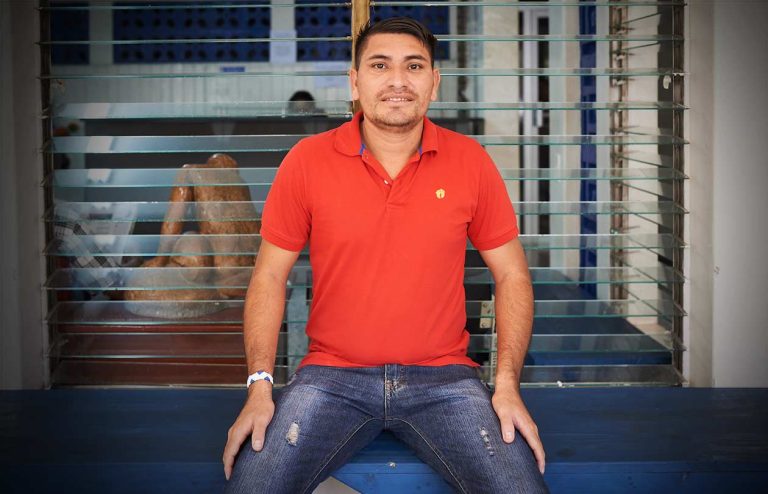7 de julio 2023

Children of Exile: The Births “Sowing Hope” in the Camp of Nicaraguan Farmers

PUBLICIDAD 1M
PUBLICIDAD 4D
PUBLICIDAD 5D
Each desertion further demoralizes a police force that has become an armed body in favor of Ortega's dictatorship, says ex-agent

Julio César Espinoza Gallegos perteneció a la Policía Nacional. Foto: Confidencial
Daniel Ortega’s decision to order his deputies in the National Assembly to reform the Constitution and Law 872 of the National Police only seeks to tighten his grip over an institution that is already utterly subordinate to the dictatorship, says former riot police officer Julio Cesar Espinoza Gallegos.
In an interview with Confidencial and the program Esta Noche, this former officer, now living in exile, recognizes that it is difficult to evade a system in which the chiefs “hammer you morning, noon and night” that you are there to serve the “good government” (in reference to the Ortega-Murillo administration), and that you should be ready to give your life for the dictators.
Julio, thanks for talking to our audience. You are a former Special Forces officer of the Nicaraguan Police who defected in 2018. What is your opinion of the new reforms to the constitution and law 872 of the Police, which aims to punish and sanction with imprisonment police officers who defect from the institution?
They are approving the law so that police agents will be fearful of leaving and abandoning the ranks.
You were imprisoned when you deserted because you refused to repress the 2018 protests. That means it is a practice that has been used since then: to punish those who desert. Do you know of other cases like yours?
Police officers are deserting, and the truth is that they had to approve this law to keep them subdued and serving him (Ortega). There is a policeman, if I remember correctly, who resigned in 2019, and he was captured at the border and is still detained. He was accused of international drug trafficking.
How do police chiefs react when those who defect are their subordinates? What moral impact does that have on the institution?
The moral impact that exists within the institution when an agent resigns is great because they push the idea of the “good government” on you all the time, and how one must serve them and give your life to defend them.
What fear do police agents have, those who do not agree with the repression, who do not share the idea of repressing the people? What fear do they have inside the institution?
Logically, they know that to resign from the Ortega regime means jail, torture and even being killed. To disappear or go into exile.
Do you know how Police officers feel when they are forced, for example, to obey orders to repress the people, and they disagree with that? What is the feeling of the officers of the at this moment?
Evidently, up to the time I was with the Police, many officers did not want to repress and do all that, but they were afraid of being imprisoned or for them to take it out with their families. But well, in the end they are still there. They say it is out of necessity, but the truth is that you do not measure the consequences when you love your country, and that was my case. I am exiled in Europe, and the truth is that I was not interested in leaving the ranks of the Police to serve my people.
You were part of the police for six years, when the Police enjoyed a certain prestige and credibility at the national, even regional level, even though there had already been some repression events in favor of the interests of the dictatorship. However, since 2018 Ortega has used the institution to repress the entire population. How do you see today that institution of which you were part of? How do you see its future?
There were repressions, but they had not come to light. But by 2018, everything had exploded, and today, the Police is no longer a civilian force that protects the people. Now it has to abide by the mandate of Daniel Ortega. The path that the Police is taking is that of an armed body in support of the Ortega dictatorship.
This article was originally published in Spanish in Confidencial and translated by Havana Times.
PUBLICIDAD 3M
Periodista nicaragüense, exiliado en Costa Rica. Durante más de veinte años se ha desempeñado en CONFIDENCIAL como periodista de Economía. Antes trabajó en el semanario La Crónica, el diario La Prensa y El Nuevo Diario. Además, ha publicado en el Diario de Hoy, de El Salvador. Ha ganado en dos ocasiones el Premio a la Excelencia en Periodismo Pedro Joaquín Chamorro Cardenal, en Nicaragua.
PUBLICIDAD 3D